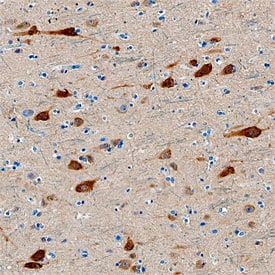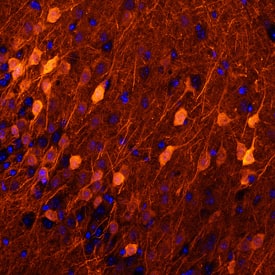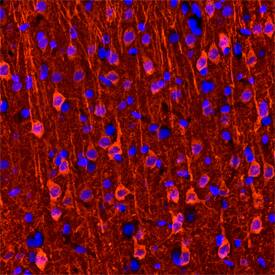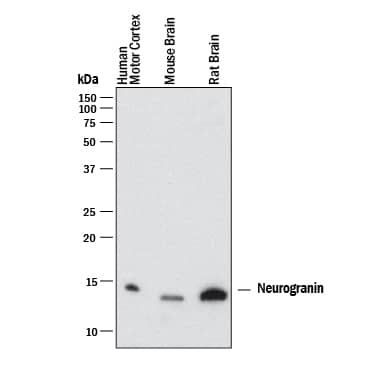Human/Mouse/Rat Neurogranin Antibody
R&D Systems, part of Bio-Techne | Catalog # MAB7947

Key Product Details
Species Reactivity
Human, Mouse, Rat
Applications
Immunohistochemistry, Western Blot
Label
Unconjugated
Antibody Source
Monoclonal Mouse IgG3 Clone # 898502
Product Specifications
Immunogen
E. coli-derived recombinant human Neurogranin
Met1-Asp78
Accession # Q92686
Met1-Asp78
Accession # Q92686
Specificity
Detects human Neurogranin in ELISAs.
Clonality
Monoclonal
Host
Mouse
Isotype
IgG3
Scientific Data Images for Human/Mouse/Rat Neurogranin Antibody
Detection of Human, Mouse, and Rat Neurogranin by Western Blot.
Western blot shows lysates of human brain (motor cortex), mouse brain, and rat brain. PVDF membrane was probed with 2 µg/mL of Mouse Anti-Human/Mouse/Rat Neurogranin Monoclonal Antibody (Catalog # MAB7947) followed by HRP-conjugated Anti-Mouse IgG Secondary Antibody (HAF018). A specific band was detected for Neurogranin at approximately 13-14 kDa (as indicated). This experiment was conducted under reducing conditions and using Western Blot Buffer Group 1.Neurogranin in Human Cortex.
Neurogranin was detected in formalin fixed paraffin-embedded sections of human cortex using Mouse Anti-Human/Mouse/Rat Neurogranin Monoclonal Antibody (Catalog # MAB7947) at 15 µg/mL overnight at 4 °C. Tissue was stained using the Anti-Mouse HRP-DAB Cell & Tissue Staining Kit (brown; Catalog # CTS002) and counterstained with hematoxylin (blue). Specific staining was localized to neuronal cell bodies and dendrites. View our protocol for Chromogenic IHC Staining of Paraffin-embedded Tissue Sections.Neurogranin in Mouse Brain.
Neurogranin was detected in perfusion fixed frozen sections of mouse brain using Mouse Anti-Human/Mouse/Rat Neurogranin Monoclonal Antibody (Catalog # MAB7947) at 25 µg/mL overnight at 4 °C. Tissue was stained using the NorthernLights™ 557-conjugated Anti-Mouse IgG Secondary Antibody (red; Catalog # NL007) and counterstained with DAPI (blue). Specific staining was localized to cytoplasm in neurons. View our protocol for Fluorescent IHC Staining of Frozen Tissue Sections.Applications for Human/Mouse/Rat Neurogranin Antibody
Application
Recommended Usage
Immunohistochemistry
8-25 µg/mL
Sample: Immersion fixed paraffin-embedded sections of human cortex, and perfusion fixed frozen sections of mouse brain and rat brain
Sample: Immersion fixed paraffin-embedded sections of human cortex, and perfusion fixed frozen sections of mouse brain and rat brain
Western Blot
2 µg/mL
Sample: Human brain (motor cortex), mouse brain, and rat brain
Sample: Human brain (motor cortex), mouse brain, and rat brain
Formulation, Preparation, and Storage
Purification
Protein A or G purified from hybridoma culture supernatant
Reconstitution
Reconstitute at 0.5 mg/mL in sterile PBS. For liquid material, refer to CoA for concentration.
Formulation
Lyophilized from a 0.2 μm filtered solution in TBS with Trehalose. *Small pack size (SP) is supplied either lyophilized or as a 0.2 µm filtered solution in PBS.
Shipping
Lyophilized product is shipped at ambient temperature. Liquid small pack size (-SP) is shipped with polar packs. Upon receipt, store immediately at the temperature recommended below.
Stability & Storage
Use a manual defrost freezer and avoid repeated freeze-thaw cycles.
- 12 months from date of receipt, -20 to -70 °C as supplied.
- 1 month, 2 to 8 °C under sterile conditions after reconstitution.
- 6 months, -20 to -70 °C under sterile conditions after reconstitution.
Background: Neurogranin
Alternate Names
hng, NRGN, RC3
Gene Symbol
NRGN
UniProt
Additional Neurogranin Products
Product Documents for Human/Mouse/Rat Neurogranin Antibody
Product Specific Notices for Human/Mouse/Rat Neurogranin Antibody
For research use only
